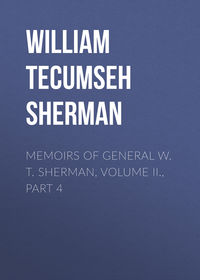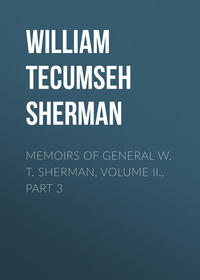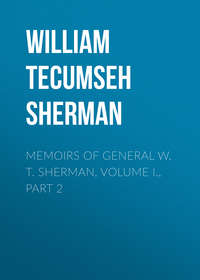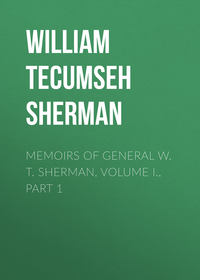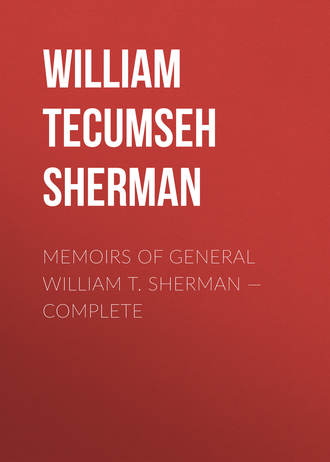 полная версия
полная версияMemoirs of General William T. Sherman — Complete
I took passage December 4th in the steamer John Aull for New Orleans. As we passed Cairo the snow was falling, and the country was wintery and devoid of verdure. Gradually, however, as we proceeded south, the green color came; grass and trees showed the change of latitude, and when in the course of a week we had reached New Orleans, the roses were in full bloom, the sugar-cane just ripe, and a tropical air prevalent. We reached New Orleans December 11, 1843, where I spent about a week visiting the barracks, then occupied by the Seventh Infantry; the theatres, hotels, and all the usual places of interest of that day.
On the 16th of December I continued on to Mobile in the steamer Fashion by way of Lake Pontchartrain; saw there most of my personal friends, Mr. and Mrs. Bull, Judge Bragg and his brother Dunbar, Deshon, Taylor, and Myers, etc., and on the 19th of December took passage in the steamboat Bourbon for Montgomery, Alabama, by way of the Alabama River. We reached Montgomery at noon, December 23d, and took cars at 1 p. m. for Franklin, forty miles, which we reached at 7 p. m., thence stages for Griffin, Georgia, via La Grange and Greenville. This took the whole night of the 23d and the day of the 24th. At Griffin we took cars for Macon, and thence to Savannah, which we reached Christmas-night, finding Lieutenants Ridgley and Ketchum at tea, where we were soon joined by Rankin and Beckwith.
On the 26th I took the boat for Charleston, reaching my post, and reported for duty Wednesday morning, December 27, 1843.
I had hardly got back to my post when, on the 21st of January, 1844, I received from Lieutenant R. P. Hammond, at Marietta, Georgia, an intimation that Colonel Churchill, Inspector-General of the Army, had applied for me to assist him in taking depositions in upper Georgia and Alabama; concerning certain losses by volunteers in Florida of horses and equipments by reason of the failure of the United States to provide sufficient forage, and for which Congress had made an appropriation. On the 4th of February the order came from the Adjutant-General in Washington for me to proceed to Marietta, Georgia, and report to Inspector-General Churchill. I was delayed till the 14th of February by reason of being on a court-martial, when I was duly relieved and started by rail to Augusta, Georgia, and as far as Madison, where I took the mail-coach, reaching Marietta on the 17th. There I reported for duty to Colonel Churchill, who was already engaged on his work, assisted by Lieutenant R. P. Hammond, Third Artillery, and a citizen named Stockton. The colonel had his family with him, consisting of Mrs. Churchill, Mary, now Mrs. Professor Baird, and Charles Churchill, then a boy of about fifteen years of age.
We all lived in a tavern, and had an office convenient. The duty consisted in taking individual depositions of the officers and men who had composed two regiments and a battalion of mounted volunteers that had served in Florida. An oath was administered to each man by Colonel Churchill, who then turned the claimant over to one of us to take down and record his deposition according to certain forms, which enabled them to be consolidated and tabulated. We remained in Marietta about six weeks, during which time I repeatedly rode to Kenesaw Mountain, and over the very ground where afterward, in 1864, we had some hard battles.
After closing our business at Marietta the colonel ordered us to transfer our operations to Bellefonte, Alabama. As he proposed to take his family and party by the stage, Hammond lent me his riding-horse, which I rode to Allatoona and the Etowah River. Hearing of certain large Indian mounds near the way, I turned to one side to visit them, stopping a couple of days with Colonel Lewis Tumlin, on whose plantation these mounds were. We struck up such an acquaintance that we corresponded for some years, and as I passed his plantation during the war, in 1864, I inquired for him, but he was not at home. From Tumlin's I rode to Rome, and by way of Wills Valley over Sand Mountain and the Raccoon Range to the Tennessee River at Bellefonte, Alabama. We all assembled there in March, and continued our work for nearly two months, when, having completed the business, Colonel Churchill, with his family, went North by way of Nashville; Hammond, Stockton, and I returning South on horseback, by Rome, Allatoona, Marietta, Atlanta, and Madison, Georgia. Stockton stopped at Marietta, where he resided. Hammond took the cars at Madison, and I rode alone to Augusta, Georgia, where I left the horse and returned to Charleston and Fort Moultrie by rail.
Thus by a mere accident I was enabled to traverse on horseback the very ground where in after-years I had to conduct vast armies and fight great battles. That the knowledge thus acquired was of infinite use to me, and consequently to the Government, I have always felt and stated.
During the autumn of 1844, a difficulty arose among the officers of Company B, Third Artillery (John R. Yinton's), garrisoning Augusta Arsenal, and I was sent up from Fort Moultrie as a sort of peace-maker. After staying there some months, certain transfers of officers were made, which reconciled the difficulty, and I returned to my post, Fort Moultrie. During that winter, 1844-'45, I was visiting at the plantation of Mr. Poyas, on the east branch of the Cooper, about fifty miles from Fort Moultrie, hunting deer with his son James, and Lieutenant John F. Reynolds, Third Artillery. We had taken our stands, and a deer came out of the swamp near that of Mr. James Poyas, who fired, broke the leg of the deer, which turned back into the swamp and came out again above mine. I could follow his course by the cry of the hounds, which were in close pursuit. Hastily mounting my horse, I struck across the pine-woods to head the deer off, and when at full career my horse leaped a fallen log and his fore-foot caught one of those hard, unyielding pineknots that brought him with violence to the ground. I got up as quick as possible, and found my right arm out of place at the shoulder, caused by the weight of the double-barrelled gun.
Seeing Reynolds at some distance, I called out lustily and brought him to me. He soon mended the bridle and saddle, which had been broken by the fall, helped me on my horse, and we followed the coarse of the hounds. At first my arm did not pain me much, but it soon began to ache so that it was almost unendurable. In about three miles we came to a negro hut, where I got off and rested till Reynolds could overtake Poyas and bring him back. They came at last, but by that time the arm was so swollen and painful that I could not ride. They rigged up an old gig belonging to the negro, in which I was carried six miles to the plantation of Mr. Poyas, Sr. A neighboring physician was sent for, who tried the usual methods of setting the arm, but without success; each time making the operation more painful. At last he sent off, got a set of double pulleys and cords, with which he succeeded in extending the muscles and in getting the bone into place. I then returned to Fort Moultrie, but being disabled, applied for a short leave and went North.
I started January 25,1845; went to Washington, Baltimore, and Lancaster, Ohio, whence I went to Mansfield, and thence back by Newark to Wheeling, Cumberland, Baltimore, Philadelphia, and New York, whence I sailed back for Charleston on the ship Sullivan, reaching Fort Moultrie March 9, 1845.
About that time (March 1, 1845) Congress had, by a joint resolution, provided for the annexation of Texas, then an independent Republic, subject to certain conditions requiring the acceptance of the Republic of Texas to be final and conclusive. We all expected war as a matter of course. At that time General Zachary Taylor had assembled a couple of regiments of infantry and one of dragoons at Fort Jessup, Louisiana, and had orders to extend military protection to Texas against the Indians, or a "foreign enemy," the moment the terms of annexation were accepted. He received notice of such acceptance July 7th, and forthwith proceeded to remove his troops to Corpus Christi, Texas, where, during the summer and fall of 1845, was assembled that force with which, in the spring of 1846, was begun the Mexican War.
Some time during that summer came to Fort Moultrie orders for sending Company E, Third Artillery, Lieutenant Bragg, to New Orleans, there to receive a battery of field-guns, and thence to the camp of General Taylor at Corpus Christi. This was the first company of our regiment sent to the seat of war, and it embarked on the brig Hayne. This was the only company that left Fort Moultrie till after I was detached for recruiting service on the 1st of May, 1846.
Inasmuch as Charleston afterward became famous, as the spot where began our civil war, a general description of it, as it was in 1846, will not be out of place.
The city lies on a long peninsula between the Ashley and Cooper Rivers—a low, level peninsula, of sand. Meeting Street is its Broadway, with King Street, next west and parallel, the street of shops and small stores. These streets are crossed at right angles by many others, of which Broad Street was the principal; and the intersection of Meeting and Broad was the heart of the city, marked by the Guard-House and St. Michael's Episcopal Church. The Custom-House, Post-Office, etc., were at the foot of Broad Street, near the wharves of the Cooper River front. At the extremity of the peninsula was a drive, open to the bay, and faced by some of the handsomest houses of the city, called the "Battery." Looking down the bay on the right, was James Island, an irregular triangle of about seven miles, the whole island in cultivation with sea-island cotton. At the lower end was Fort Johnson, then simply the station of Captain Bowman, United States Engineers, engaged in building Fort Sumter. This fort (Sumter) was erected on an artificial island nearly in mid-channel, made by dumping rocks, mostly brought as ballast in cotton-ships from the North. As the rock reached the surface it was levelled, and made the foundation of Fort Sumter. In 1846 this fort was barely above the water. Still farther out beyond James Island, and separated from it by a wide space of salt marsh with crooked channels, was Morris Island, composed of the sand-dunes thrown up by the wind and the sea, backed with the salt marsh. On this was the lighthouse, but no people.
On the left, looking down the bay from the Battery of Charleston, was, first, Castle Pinckney, a round brick fort, of two tiers of guns, one in embrasure, the other in barbette, built on a marsh island, which was not garrisoned. Farther down the bay a point of the mainland reached the bay, where there was a group of houses, called Mount Pleasant; and at the extremity of the bay, distant six miles, was Sullivan's Island, presenting a smooth sand-beach to the sea, with the line of sand-hills or dunes thrown up by the waves and winds, and the usual backing of marsh and crooked salt-water channels.
At the shoulder of this island was Fort Moultrie, an irregular fort, without ditch or counterscarp, with a brick scarp wall about twelve feet high, which could be scaled anywhere, and this was surmounted by an earth parapet capable of mounting about forty twenty-four and thirty-two pounder smooth-bore iron guns. Inside the fort were three two-story brick barracks, sufficient to quarter the officers and men of two companies of artillery.
At sea was the usual "bar," changing slightly from year to year, but generally the main ship-channel came from the south, parallel to Morris Island, till it was well up to Fort Moultrie, where it curved, passing close to Fort Sumter and up to the wharves of the city, which were built mostly along the Cooper River front.
Charleston was then a proud, aristocratic city, and assumed a leadership in the public opinion of the South far out of proportion to her population, wealth, or commerce. On more than one occasion previously, the inhabitants had almost inaugurated civil war, by their assertion and professed belief that each State had, in the original compact of government, reserved to itself the right to withdraw from the Union at its own option, whenever the people supposed they had sufficient cause. We used to discuss these things at our own mess-tables, vehemently and sometimes quite angrily; but I am sure that I never feared it would go further than it had already gone in the winter of 1832-'33, when the attempt at "nullification" was promptly suppressed by President Jackson's famous declaration, "The Union must and shall be preserved!" and by the judicious management of General Scott.
Still, civil war was to be; and, now that it has come and gone, we can rest secure in the knowledge that as the chief cause, slavery, has been eradicated forever, it is not likely to come again.
CHAPTER II.
EARLY RECOLLECTIONS of CALIFORNIA
1846-1848In the spring of 1846 I was a first lieutenant of Company C,1, Third Artillery, stationed at Fort Moultrie, South Carolina. The company was commanded by Captain Robert Anderson; Henry B. Judd was the senior first-lieutenant, and I was the junior first-lieutenant, and George B. Ayres the second-lieutenant. Colonel William Gates commanded the post and regiment, with First-Lieutenant William Austine as his adjutant. Two other companies were at the post, viz., Martin Burke's and E. D. Keyes's, and among the officers were T. W. Sherman, Morris Miller, H. B. Field, William Churchill, Joseph Stewart, and Surgeon McLaren.
The country now known as Texas had been recently acquired, and war with Mexico was threatening. One of our companies (Bragg's), with George H. Thomas, John F. Reynolds, and Frank Thomas, had gone the year previous and was at that time with General Taylor's army at Corpus Christi, Texas.
In that year (1846) I received the regular detail for recruiting service, with orders to report to the general superintendent at Governor's Island, New York; and accordingly left Fort Moultrie in the latter part of April, and reported to the superintendent, Colonel R. B. Mason, First Dragoons, at New York, on the 1st day of May. I was assigned to the Pittsburg rendezvous, whither I proceeded and relieved Lieutenant Scott. Early in May I took up my quarters at the St. Charles Hotel, and entered upon the discharge of my duties. There was a regular recruiting-station already established, with a sergeant, corporal, and two or three men, with a citizen physician, Dr. McDowell, to examine the recruits. The threatening war with Mexico made a demand for recruits, and I received authority to open another sub-rendezvous at Zanesville, Ohio, whither I took the sergeant and established him. This was very handy to me, as my home was at Lancaster, Ohio, only thirty-six miles off, so that I was thus enabled to visit my friends there quite often.
In the latter part of May, when at Wheeling, Virginia, on my way back from Zanesville to Pittsburg, I heard the first news of the battle of Palo Alto and Resaca de la Palma, which occurred on the 8th and 9th of May, and, in common with everybody else, felt intensely excited. That I should be on recruiting service, when my comrades were actually fighting, was intolerable, and I hurried on to my post, Pittsburg. At that time the railroad did not extend west of the Alleghanies, and all journeys were made by stage-coaches. In this instance I traveled from Zanesville to Wheeling, thence to Washington (Pennsylvania), and thence to Pittsburg by stage-coach. On reaching Pittsburg I found many private letters; one from Ord, then a first-lieutenant in Company F, Third Artillery, at Fort McHenry, Baltimore, saying that his company had just received orders for California, and asking me to apply for it. Without committing myself to that project, I wrote to the Adjutant-General, R. Jones, at Washington, D. C., asking him to consider me as an applicant for any active service, and saying that I would willingly forego the recruiting detail, which I well knew plenty of others would jump at. Impatient to approach the scene of active operations, without authority (and I suppose wrongfully), I left my corporal in charge of the rendezvous, and took all the recruits I had made, about twenty-five, in a steamboat to Cincinnati, and turned them over to Major N. C. McCrea, commanding at Newport Barracks. I then reported in Cincinnati, to the superintendent of the Western recruiting service, Colonel Fanning, an old officer with one arm, who inquired by what authority I had come away from my post. I argued that I took it for granted he wanted all the recruits he could get to forward to the army at Brownsville, Texas; and did not know but that he might want me to go along. Instead of appreciating my volunteer zeal, he cursed and swore at me for leaving my post without orders, and told me to go back to Pittsburg. I then asked for an order that would entitle me to transportation back, which at first he emphatically refused, but at last he gave the order, and I returned to Pittsburg, all the way by stage, stopping again at Lancaster, where I attended the wedding of my schoolmate Mike Effinger, and also visited my sub-rendezvous at Zanesville. R. S. Ewell, of my class, arrived to open a cavalry rendezvous, but, finding my depot there, he went on to Columbus, Ohio. Tom Jordan afterward was ordered to Zanesville, to take charge of that rendezvous, under the general War Department orders increasing the number of recruiting-stations. I reached Pittsburg late in June, and found the order relieving me from recruiting service, and detailing my classmate H. B. Field to my place. I was assigned to Company F, then under orders for California. By private letters from Lieutenant Ord, I heard that the company had already started from Fort McHenry for Governor's Island, New York Harbor, to take passage for California in a naval transport. I worked all that night, made up my accounts current, and turned over the balance of cash to the citizen physician, Dr. McDowell; and also closed my clothing and property returns, leaving blank receipts with the same gentleman for Field's signature, when he should get there, to be forwarded to the Department at Washington, and the duplicates to me. These I did not receive for more than a year. I remember that I got my orders about 8 p. m. one night, and took passage in the boat for Brownsville, the next morning traveled by stage from Brownsville to Cumberland, Maryland, and thence by cars to Baltimore, Philadelphia, and New York, in a great hurry lest the ship might sail without me. I found Company F at Governor's Island, Captain C. Q. Tompkins in command, Lieutenant E. O. C. Ord senior first-lieutenant, myself junior first-lieutenant, Lucien Loeser and Charles Minor the second-lieutenants.
The company had been filled up to one hundred privates, twelve non-commissioned officers, and one ordnance sergeant (Layton), making one hundred and thirteen enlisted men and five officers. Dr. James L. Ord had been employed as acting assistant surgeon to accompany the expedition, and Lieutenant H. W. Halleck, of the engineers, was also to go along. The United States store-ship Lexington was then preparing at the Navy-Yard, Brooklyn, to carry us around Cape Horn to California. She was receiving on board the necessary stores for the long voyage, and for service after our arrival there. Lieutenant-Commander Theodorus Bailey was in command of the vessel, Lieutenant William H. Macomb executive officer, and Passed-Midshipmen Muse, Spotts, and J. W. A. Nicholson, were the watch-officers; Wilson purser, and Abernethy surgeon. The latter was caterer of the mess, and we all made an advance of cash for him to lay in the necessary mess-stores. To enable us to prepare for so long a voyage and for an indefinite sojourn in that far-off country, the War Department had authorized us to draw six months' pay in advance, which sum of money we invested in surplus clothing and such other things as seemed to us necessary. At last the ship was ready, and was towed down abreast of Fort Columbus, where we were conveyed on board, and on the 14th of July, 1846, we were towed to sea by a steam-tug, and cast off: Colonel R. B. Mason, still superintendent of the general recruiting service, accompanied us down the bay and out to sea, returning with the tug. A few other friends were of the party, but at last they left us, and we were alone upon the sea, and the sailors were busy with the sails and ropes. The Lexington was an old ship, changed from a sloop-of-war to a store-ship, with an after-cabin, a "ward-room," and "between-decks." In the cabin were Captains Bailey and Tompkins, with whom messed the purser, Wilson. In the ward-room were all the other officers, two in each state-room; and Minor, being an extra lieutenant, had to sleep in a hammock slung in the ward-room. Ord and I roomed together; Halleck and Loeser and the others were scattered about. The men were arranged in bunks "between-decks," one set along the sides of the ship, and another, double tier, amidships. The crew were slung in hammocks well forward. Of these there were about fifty. We at once subdivided the company into four squads, under the four lieutenants of the company, and arranged with the naval officers that our men should serve on deck by squads, after the manner of their watches; that the sailors should do all the work aloft, and the soldiers on deck.
On fair days we drilled our men at the manual, and generally kept them employed as much as possible, giving great attention to the police and cleanliness of their dress and bunks; and so successful were we in this, that, though the voyage lasted nearly two hundred days, every man was able to leave the ship and march up the hill to the fort at Monterey, California, carrying his own knapsack and equipments.
The voyage from New York to Rio Janeiro was without accident or any thing to vary the usual monotony. We soon settled down to the humdrum of a long voyage, reading some, not much; playing games, but never gambling; and chiefly engaged in eating our meals regularly. In crossing the equator we had the usual visit of Neptune and his wife, who, with a large razor and a bucket of soapsuds, came over the sides and shaved some of the greenhorns; but naval etiquette exempted the officers, and Neptune was not permitted to come aft of the mizzen-mast. At last, after sixty days of absolute monotony, the island of Raza, off Rio Janeiro, was descried, and we slowly entered the harbor, passing a fort on our right hand, from which came a hail, in the Portuguese language, from a huge speaking-trumpet, and our officer of the deck answered back in gibberish, according to a well-understood custom of the place. Sugar-loaf Mountain, on the south of the entrance, is very remarkable and well named; is almost conical, with a slight lean. The man-of-war anchorage is about five miles inside the heads, directly in front of the city of Rio Janeiro. Words will not describe the beauty of this perfect harbor, nor the delightful feeling after a long voyage of its fragrant airs, and the entire contrast between all things there and what we had left in New York.
We found the United Staten frigate Columbia anchored there, and after the Lexington was properly moored, nearly all the officers went on shore for sight-seeing and enjoyment. We landed at a wharf opposite which was a famous French restaurant, Farroux, and after ordering supper we all proceeded to the Rua da Ouvador, where most of the shops were, especially those for making feather flowers, as much to see the pretty girls as the flowers which they so skillfully made; thence we went to the theatre, where, besides some opera, we witnessed the audience and saw the Emperor Dom Pedro, and his Empress, the daughter of the King of Sicily. After the theatre, we went back to the restaurant, where we had an excellent supper, with fruits of every variety and excellence, such as we had never seen before, or even knew the names of. Supper being over, we called for the bill, and it was rendered in French, with Brazilian currency. It footed up some twenty-six thousand reis. The figures alarmed us, so we all put on the waiters' plate various coins in gold, which he took to the counter and returned the change, making the total about sixteen dollars. The millreis is about a dollar, but being a paper-money was at a discount, so as only to be worth about fifty-six cents in coin.


